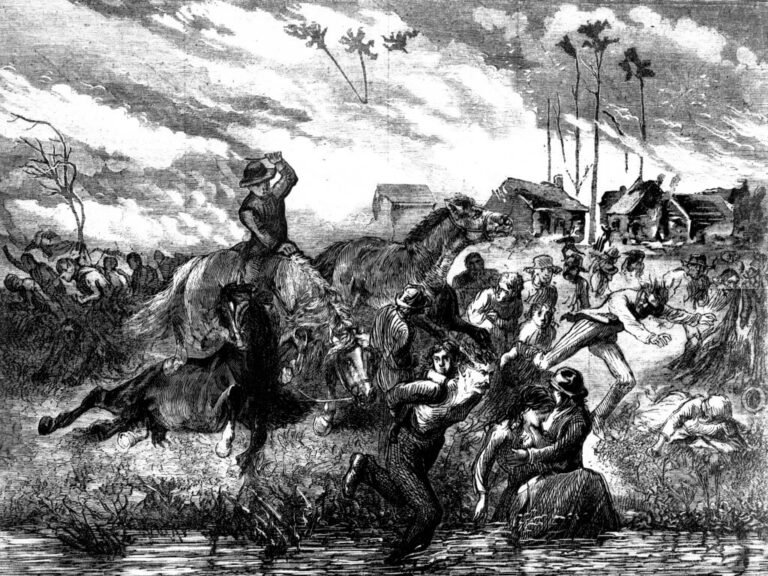Possession and Loss in Gone to the Forest

The fictional, nameless nation in Katie Kitamura’s 2012 novel, Gone to the Forest, is a country of men obsessed with possession. They care to possess land, money, women. What use these things might be to them is hardly of any interest. The main thing is to own them, to overpower them, and only then decide whether to exploit them.
For decades, the island, on which the notion of property did not previously exist, maintains a textbook colonialist status quo—white settlers ruling the land regardless of their skill at nurturing it, Indigenous people either serving white masters or living in squalor, and women doing what they can or are forced to do in order to make bearable—if powerless—lives for themselves. But a potent combination of revolts—unrest among the native people coupled with a volcanic eruption—creates a shift in the familiar dynamic: an outburst of natural and human violence that seems almost inevitable when read about in history books, yet always comes as a surprise to those in power when it happens. When these implosions occur, true natures are tested and revealed; the core of every human being is exposed.
Readers find then that the owner of a vast farm, referred to as “the old man,” who settled on the island decades ago and is the physical epitome of a master of the outdoors—leaden, robust, impermeable—neither makes wise use of his land as a source of income nor properly manages his finances, allowing his household to slip into poverty and disarray. He demonstrates his pure passion for possession by taking Carine, the young woman whom he arranged to become engaged to his son, Tom, as his own lover. But when news arrives of new land partition arrangements made by the government in an effort to quell the brewing revolt, the old man ignores the expropriation of his land until it is too late, and all he can do is flee. He knows only to own things, and even then does not tend to them. He does not show any affection or attention to his son Tom, to Carine, or to any of the Indigenous people he’s employed for years (including one who has borne him an illegitimate son).
In that sense he is very much like the other white settlers he condescends to, and who, one evening on his farm, violently rape Carine. Taking a woman, using her, hurting her—all are actions that come naturally to these men, so naturally that they make Carine herself doubt her own victimhood and take on culpability for feeling desire in the first place. Though they crave ownership and possession, the men have no loyalty to the land or even toward their fellow settlers. When the land they have claimed as their own is taken away from them, they find new ways to impart violence and ruin wherever they turn, harming the native people and women of the island in particular and continuing to possess in whatever new, small ways they find.
Though a woman and therefore impotent, when chaos ensues Carine, however, shows herself to be strong, a survivor. She sees the old man with his undying power as a kindred spirit. Her personal history is unclear but seems to involve some societal fall from grace, from which she emerged anew, reborn on the island. It is obvious to her that if it were not for the limitations placed on her by the misogyny of her surroundings, she would have free run of the farm, and do a much better job of it than her older lover had. She could have been his successor, and indeed seems much more like a true child of his than Tom. Tom, who was born on the island, does not entertain the same desire to possess it. To him, the island simply is. He has no need to own it or even see most of it. Unlike the other men around him, he does respect and fear it, intuiting what it is capable of. In that sense, Tom can never be a true master of the land. His inherent belonging there makes him a bad fit. When he is faced with the prospect of a love affair with Carine, he panics; when the farm is left for him to tend, he quickly learns of its dire straits and proceeds to retire, feverish, to his bed; when he has the chance to speak his mind to his father, he remains silent. Tom lets the world be, and the world does with him as it wishes—first nothing, then violence.
At its core, Gone to the Forest is a book about the dangers of colonialism—not only the obvious dangers to those occupied and ruled by another people, but also the nefarious ways in which the colonialist state of mind permeates not only its victims but its perpetrators. These are ills that infect anyone who comes in contact with a life lived under or alongside oppression. The old man doesn’t just happen to ignore his son until he needs to foist his own problems onto him. He’d taught himself to use other people and their property for his own causes. The other white settlers don’t just hate women—subjugating and controlling has grown to feel like a right or even a duty. It is no coincidence that Carine separates love from desire and desire from marriage—she has been taught the hard way to find herself a safe spot in which she is taken care of, regardless of how she feels there. Tom, who seems at first glance to be the only one unblemished by this aggression, is made so helpless by it that he cannot even properly express his tender love for his father or the land. Colonialism has taught him that he has worth only as a commodity or a moneymaker and that his own emotions and ailments are of no value at all.
It’s easy enough to think of the recurring themes in this novel as discreet issues. We’ve seen all of them appear in many stories in one form or another—misogyny and the vulnerability of women, racism and the exploitation of Black, Indigenous, and people of color, the ravaging of land, fraught or broken father-son relationships. But when put together in a setting explicitly made of occupation, appropriation, and disenfranchisement, the connecting lines become clear. It is impossible to be in a position of lordship over a group of people or a place without developing a twisted relationship to others and an inflated perception of one’s own power, and it is impossible to be controlled and possessed without nurturing some form of anger.


